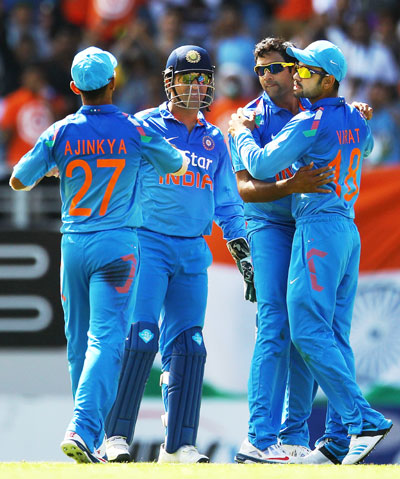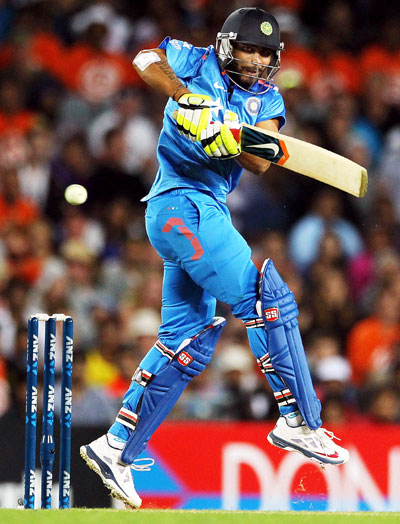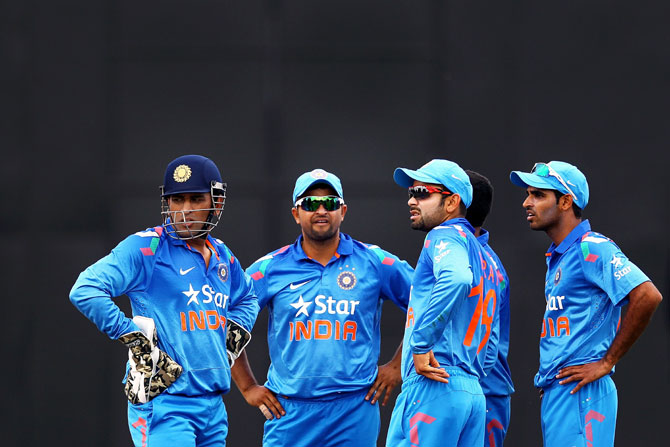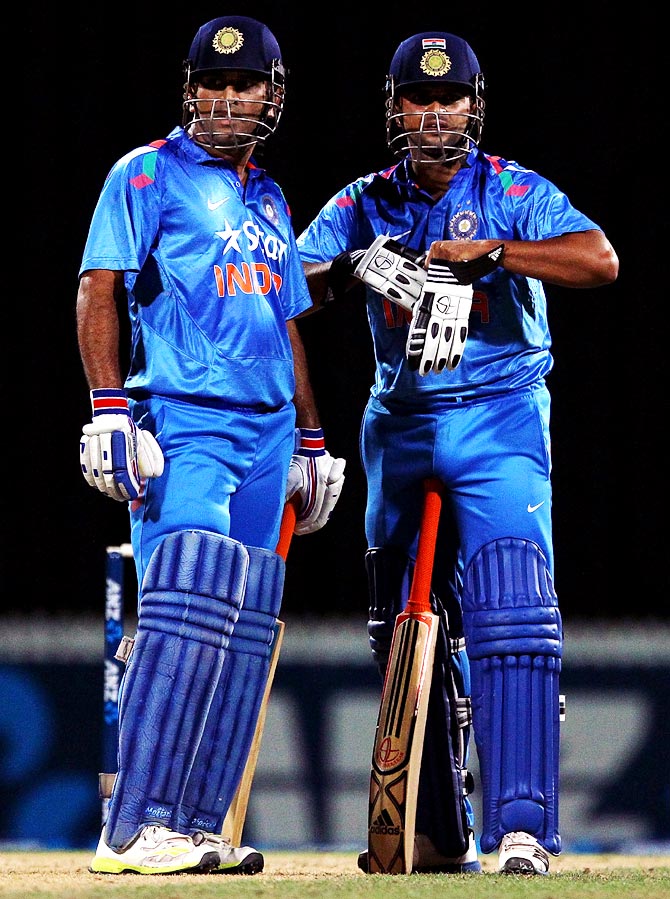Photographs: Getty Images
Having snatched a thrilling tie from the jaws of defeat in the last game, India will look to build on their new-found momentum and aim for a first victory on the tour to keep the contest alive when they take on New Zealand in the fourth ODI in Hamilton on Tuesday.
New Zealand lead the series 2-0 after winning the first two ODIs, in Napier (by 24 runs) and Hamilton (by 15 runs), while the third match at Auckland ended in a scintillating last-ball tie on Saturday.
Even though India cannot win the series, the visitors can, at least, level the rubber and keep their world No 1 ranking intact.
However, for that to happen they need need to win Tuesday's match at Seddon Park as well as the fifth ODI at Wellington.
Jadeja saved the day in Auckland
Image: Ravindra JadejaPhotographs: Getty Images
India's bowling in New Zealand has been a big let down for the team, but the fighting spirit and resilience of its batsmen saw the first two ODIs run close and tied the third to keep the series alive.
The team can take heart from its performance in the third ODI. Chasing an imposing 315, Ravindra Jadeja nearly pulled off a sensational victory before the contest ended in a tie.
Jadeja smacked the Kiwi bowlers to all parts of the ground to score an unbeaten 45-ball 66 and take India close to victory from a no-hope position. He was ably supported by Ravichandran Ashwin, who scored a quickfire 65 off 46 balls.
Interestingly, one of the key features of the series is India skipper Mahendra Singh Dhoni winning the toss and opting to chase in the three games.
Dhoni has preferred batting second thus far
Image: MS Dhoni, Suresh Raina, Virat Kohli and Bhuvneshwar KumarPhotographs: Getty Images
In South Africa, Dhoni won the toss in the first two ODIs, at Johannesburg and Durban, and elected to chase, thereafter losing both matches.
At home, in two ODIs versus Australia (Ranchi and Nagpur) and one against the West Indies (Kanpur), Dhoni did the same.
The last time India batted first after winning the toss was in January 2013, against England at Kochi. In 18 ODIs since then, home or away, the Men in Blue have always preferred to chase down targets after winning the toss.
The last time India batted first abroad after winning the toss was against Sri Lanka at Pallekele, back in August 2012.
If the sub-continent is taken out of this consideration, then the last occasion when India batted first after winning the toss was against South Africa in Johannesburg on January 15, 2011, a full three years ago.
It clearly shows that there is a high propensity for the Men in Blue to field first.
'Chasing allows breaking down of targets and calculations'
Image: New Zealand players celebrate the fall of an Indian wicketPhotographs: Getty Images
New Zealand, on the other hand, has preferred to bat first, and come Tuesday, the script will be more or less similar on a pitch that will be slow and become slower in the second innings.
Taking that into consideration, New Zealand will definitely want to bat first and once again post a big total on the board for the Indians to chase.
India too didn't give any indication that they will change their plan of chasing despite the slowness of the Hamilton pitch.
It seems the Indian think-tank believes that the pressure of a run-chase is more bearable, which was clearly evident from vice-captain Virat Kohli's statement after the first ODI at Napier.
'Chasing allows breaking down of targets and calculations over a period of time and overs,' Kohli had said then.
Team India has won 18 of their 30 recent ODIs bowling first
Image: Bhuvneshwar Kumar celebrates with teammatesPhotographs: Getty Images
There is evidence to support this theory. If that January 2011 date is taken as a marker, then until the tied ODI at Auckland, India have played 30 ODIs (across all venues) in which they opted to field first after winning the toss and emerged victorious in 18 (one no-result) of these matches.
It is no secret that the Indian batting – on whose prowess this chase-theory is based – has not fired in unison in this series.
The openers have squandered their starts, particularly Rohit Sharma in the last two ODIs at Hamilton and Auckland.
Ajinkya Rahane is still trying to find his feet at number four position, while Suresh Raina's compulsive pulling -– a shot he is not very good at -– is proving to be his downfall.
Dhoni has been among the runs in the series
Image: MS Dhoni and Suresh RainaPhotographs: Getty Images
Kohli and Dhoni are the only ones among runs, but their ability to chase down targets is hit by the batting line-up's inconsistency.
Even so, the three ODIs in New Zealand have been too close to call. At Napier, India fell short by only 19 runs, when Kohli, Dhoni and Jadeja fell in quick succession.
At Hamilton, if the D/L method is negated for a moment, the misfiring Indian batting did conquer the Black Caps' total of 271-1 by six runs, finishing at 277-9, with three balls to spare. And in the last game, the Indians did score 314 for nine in a start-stop stuttering fashion.
But, as Dhoni pointed out later, the important thing is that the Men in Blue are still alive in this series. This alone should be a worrisome point for New Zealand.
McCullum hasn't been forced to make a decision at the toss
Image: Brendon McCullumPhotographs: Getty Images
Brendon McCullum hasn't been forced to make a decision at the toss, and his side has become increasingly comfortable with their well-rehearsed tactic of batting first, saving wickets in the first 30 overs and then going all out in the death with wickets in hand.
But the ploy back-fired at Eden Park, almost, as Corey Anderson was dismissed cheaply for the first time in three matches.
What will definitely bother the Kiwis is that that they failed to close out the third ODI after reducing India to 146 for five at one stage.
At Auckland, for the first time in the series, the Black Caps let go off an opportunity and India pounced on it.








Comment
article